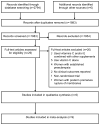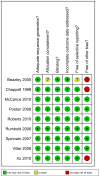Supplementation with vitamins C and E during pregnancy for the prevention of preeclampsia and other adverse maternal and perinatal outcomes: a systematic review and metaanalysis
- PMID: 21529757
- PMCID: PMC3380625
- DOI: 10.1016/j.ajog.2011.02.020
Supplementation with vitamins C and E during pregnancy for the prevention of preeclampsia and other adverse maternal and perinatal outcomes: a systematic review and metaanalysis
Abstract
Objective: To determine whether supplementation with vitamins C and E during pregnancy reduces the risk of preeclampsia and other adverse maternal and perinatal outcomes.
Study design: Systematic review and metaanalysis of randomized controlled trials.
Results: Nine trials involving a total of 19,810 women were included. Overall, there were no significant differences between the vitamin and placebo groups in the risk of preeclampsia (9.6% vs 9.6%; relative risk, 1.00, 95% confidence interval, 0.92-1.09). Similar results were obtained when subgroup analyses were restricted to women at high risk or low/moderate risk for preeclampsia. Women supplemented with vitamins C and E were at increased risk of developing gestational hypertension and premature rupture of membranes, and decreased risk of abruptio placentae. There were no significant differences between the vitamin and placebo groups in the risk of other adverse maternal or fetal/perinatal outcomes.
Conclusion: Supplementation with vitamins C and E during pregnancy does not prevent preeclampsia.
Published by Mosby, Inc.
Figures
References
-
- Villar J, Say L, Gulmezoglu M, Merialdi M, Lindheimer M, Betran AP, et al. Eclampsia and preclampsia: a health problem for 2000 years. In: Critchley H, MacLean A, Poston L, Walker J, editors. Pre-eclampsia. London: RCOG Press; 2003. pp. 189–207.
-
- Lindheimer MD, Taler SJ, Cunningham FG. Hypertension in pregnancy. J Am Soc Hypertens. 2010;4:68–78. - PubMed
-
- Redman CW, Sargent IL. Latest advances in understanding preeclampsia. Science. 2005;308:1592–4. - PubMed
-
- Roberts JM, Hubel CA. Is oxidative stress the link in the two-stage model of pre-eclampsia? Lancet. 1999;354:788–9. - PubMed
-
- Hung TH, Burton GJ. Hypoxia and reoxygenation: a possible mechanism for placental oxidative stress in preeclampsia. Taiwan J Obstet Gynecol. 2006;45:189–200. - PubMed
Publication types
MeSH terms
Substances
Grants and funding
LinkOut - more resources
Full Text Sources
Other Literature Sources
Medical




